After completing your B.Sc. Nautical Science or DNS, you can join any ship. When you first join a ship as a deck cadet you must carry out many duties onboard ship like bridge watch, deck work, painting, cleaning, grinding, maintaining a logbook, etc. In this blog, you will get to know about the major duties and jobs performed by a deck cadet onboard ship. Officially, the working hours of a deck cadet are 12 hours, but in reality it always exceeds the 12-hour period. Sometimes you’d even have to work for 14-18 hours.
Duties of a Deck Cadet Onboard ship-
- Navigation: It is the most important aspect of a ship. In the absence of a valid Certificate of Competency (COC), a cadet is naturally not allowed to keep a bridge watch. A deck cadet usually does his/her watch with the Chief Officer and learns all the duties of Officer on Watch (OOW). A deck cadet is expected to learn the science and art of navigation, which helps him become a successful officer. Normally, the Chief Officer during his/her bridge watches (0400-0800 and 1600-2000) takes out the time to teach a cadet about the work that takes place in the bridge and tests the knowledge he/she has received during his/her Nautical Science (deck cadet) course.
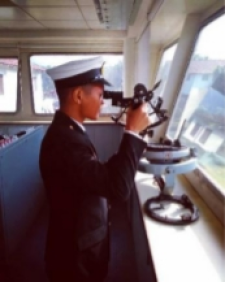
2. Tank Sounding: Sounding is the term used for measuring the amount of fluid in the tanks of a ship. Tank soundings are very crucial for ensuring the stability of the vessel and checking soundings at regular intervals is the duty of a deck cadet. A deck cadet is manually required to take soundings of all the tanks, and maintain a daily record in the logbook. Generally, it is taken after the 0400-0800 watch (before or right after breakfast).
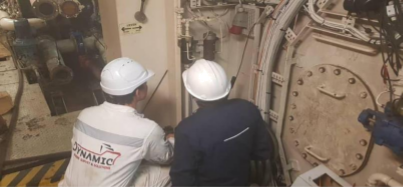
3. Maintenance: A deck cadet usually does chipping, painting along with working with the Pump man on various jobs like overhauling of valve, working on pipelines, working on pumps etc. Deck maintenance includes overall cleanliness and reporting of any abnormalities or malfunctioning within the area. These are the jobs that he/she should have experience of so that later when they become a Chief Officer they themselves know the job well, before assigning it to others.

4. Deck Work: A deck cadet’s duty is to assist the ship’s Bosun. This is grounding work, which seems very insignificant during the start of your career as a deck cadet, but this builds the framework for your future when you become an Officer. Deck work including chipping, painting, grinding, etc. is carried out to maintain the structural integrity of the deck. Along with some rope work (e.g., splicing) that gives cadets the right direction towards good seamanship. On deck, stenciling is the primary job of every deck cadet.
5. LSA/FFA Maintenance: LSA stands for Life Saving Appliances and FFA stands for Fire Fighting Appliances. Maintenance of LSA/FFA comes under the 3rd Officer. As a deck cadet you will be helping him/her in their maintenance so that he/she learns the procedures of noting down expiry dates, carrying out repair work, checking for any defects, emailing the company for ordering new products, etc. In this process, a deck cadet gets the privilege of learning a great deal about how each equipment functions and also a lot about lifeboats, life rafts, pyrotechnics, SOLAS regulations, etc. All this information is extremely useful when you will be appearing for the 2nd Officer examination. A deck cadet should be well-acquainted with all the LSA/FFA maintenance by the end of their cadetship.
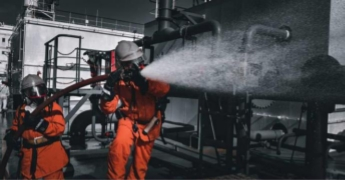
6. Paperwork at sea: A deck cadet has to assist the Chief Officer in almost all his Paperwork like maintaining the records, soundings log, etc. Making photocopies of various lists is almost always the sole job of a deck cadet. A deck cadet is the one often responsible for the position report or logging information about the vessel and the journey in the logbook.
7. Port work and Cargo Operations: Work at port includes assisting the 3rd Officer with the paperwork (Bond store, crew declaration, etc.) i.e., keeping them stamped, signed, and ready with a fair number of photocopies.
Port watches must also be done by the deck cadets on port. This includes monitoring the cargo being loaded/unloaded (involves noting down precise timings of the start and end of loading/unloading, every time it happens).
Normally, the deck cadet is made responsible to keep a tab on the tank soundings and providing continuous feedback to the duty officer on the portable VHF handheld/ walkie-talkie. Cargo work comes under the Chief Officer and the deck cadet must assist him by monitoring the level of tanks, cargo calculations, gauging of tanks, etc.
8. Berthing/Unberthing Operations: When a vessel goes alongside (from one country to another), it’s completely the responsibility of the deck side. The entire deck crew is present at their respective stations to get the vessel to berth/cast-off properly. A cadet starts out at the stations as a sort of a rating, mainly doing the physical work. A deck cadet’s duty normally includes assisting with preparations for departure and arrival at port.
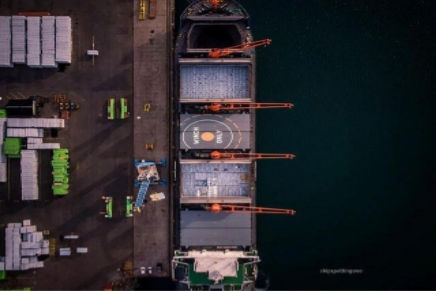
9. Mooring Operation: A deck cadet is required to actively take part in the Mooring Operation under the supervision of the deck officers. Deck cadets have to loosen the mooring ropes during low tide and tighten them when the tide is high. When a deck cadet becomes a 3rd Officer, he will also be in charge of the Mooring Operation.
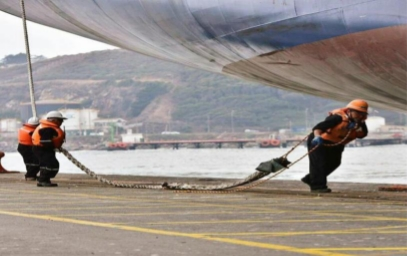
10. Project work: This also comes under the jobs of a deck cadet. While doing hands-on training they should know the theory part too and keep a record of every task they do. The Chief Officer grants the cadet some free time so that they can complete his/her project work. It is a part of the Structured Shipboard Training Programme (SSTP).
At last, you (as a deck cadet) must stay highly aware at all times, for your own safety. You must exercise safe working practices while doing all your duties as a deck cadet.
Lastly, as a Deck Cadet apart from these 12 duties mentioned above there can be so many other duties. To perform well in all of them you only require the following three major qualities-
The first quality is an eagerness to learn, if you are really eager to learn, then nobody can stop you.
The second quality is taking initiative for any work that you can see around you. It does not matter whether the job is of mopping or cleaning or painting, just take the initiative and do the best possible job.
The third and last quality that you need to have is – ‘Never tell lies’. Even if you have made a mistake, still go to your Chief Officer and own your mistake. Always remember that you are on ship with a single aim of – EARNING TRUST OF YOUR SENIORS AS WELL AS JUNIORS.
Best of luck for your journey ahead.




